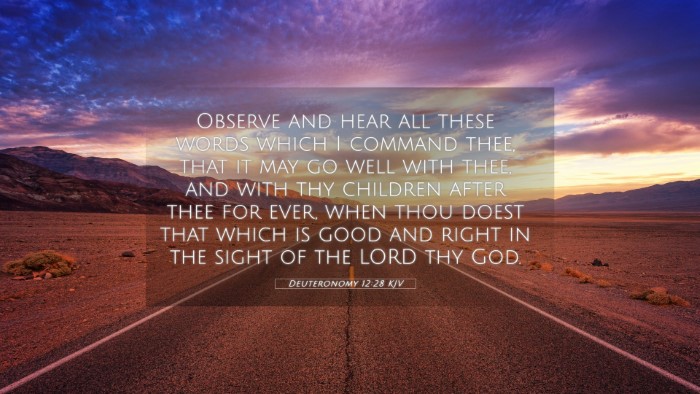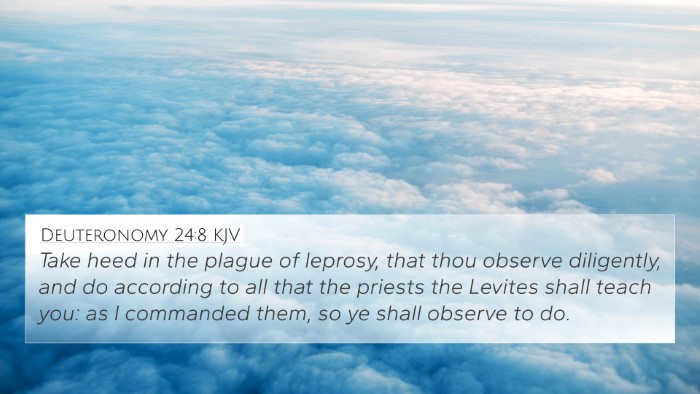Understanding Deuteronomy 12:28
Verse Text: "Observe and hear all these words which I command thee, that it may go well with thee, and with thy children after thee for ever, when thou dost that which is good and right in the sight of the LORD thy God."
Summary of Meaning
This verse encapsulates the importance of obedience to God's commandments and the blessings associated with such obedience. It emphasizes that adherence to divine law not only benefits the individual but also has implications for future generations. The blessings are conditional on doing what is considered good and right in the Lord’s eyes, reinforcing the moral responsibility one has not just for oneself but for one's progeny.
Insights from Public Domain Commentaries
Matthew Henry's Commentary
Matthew Henry notes that the promise of well-being is tied to the observance of God's commandments. He argues that there is a direct connection between our actions and the outcomes in our lives and families. His commentary highlights that the prosperity of the children is linked to the righteousness of the parents, thus creating a legacy of obedience.
Albert Barnes' Notes on the Bible
Albert Barnes emphasizes the importance of careful attention and meditation on God’s commandments. He suggests that such practice is vital for spiritual health and is a prerequisite to receiving God’s blessings. Barnes points out that the phrase "for ever" suggests that the consequences of obedience extend beyond the present into the future, establishing a covenantal relationship with God.
Adam Clarke's Commentary
Adam Clarke provides an in-depth understanding that highlights the significance of the 'good' and 'right' actions that please God. He further explains that the blessings referred to encompass both physical and spiritual dimensions, implying holistic well-being. Clarke also indicates that this verse serves as a reminder of the covenant between God and His people, which is sustained by faithfulness to His laws.
Cross References
- Exodus 20:12: "Honor your father and your mother, that your days may be prolonged in the land which the LORD your God gives you." - This verse speaks of the relationship between obedience and longevity, paralleling the concept in Deuteronomy 12:28.
- Proverbs 22:6: "Train up a child in the way he should go; even when he is old he will not depart from it." - Highlights the impact of a parent's righteousness on their child's life.
- Joshua 1:8: "This Book of the Law shall not depart from your mouth, but you shall meditate on it day and night, that you may observe to do according to all that is written in it." - Stresses the need for meditation on God’s word for success.
- Psalms 1:1-3: "Blessed is the man who walks not in the counsel of the wicked... he is like a tree planted by streams of water." - Illustrates the blessings that come from righteousness.
- Isaiah 48:18: "Oh, that you had paid attention to my commandments! Then your peace would have been like a river." - A direct connection between obedience and peace.
- Ephesians 6:1-3: "Children, obey your parents in the Lord, for this is right. Honor your father and mother." - Reflects on familial obedience and its long-term benefits.
- Jeremiah 7:23: "This command I gave them: 'Obey me, and I will be your God and you will be my people.'" - Reinforces the idea of obedience leading to God's favor.
Application and Thematic Connections
Deuteronomy 12:28 encourages believers to recognize the enduring patterns of obedience and its effects. The thematic connections suggest that by following God’s commands, individuals align themselves with His will, which is consistently shown to lead to blessings and well-being.
Utilizing tools for Bible cross-referencing can deepen one’s understanding of such verses. When studying, it’s insightful to explore how interconnected verses shape the overall biblical narrative, fostering an understanding of the profound relationships woven through scripture.
Conclusion
In summary, Deuteronomy 12:28 serves as a reminder of the reciprocal relationship between God’s commandments and human experience. By engaging with cross-references, individuals can uncover the rich tapestry of biblical themes and commands, leading to a more profound comprehension of the scriptures.














